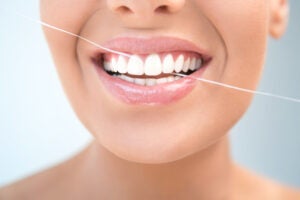-
The Hidden Dangers of Not Addressing Dental Problems

Woman addressing dental issues.
Taking care of our oral health seems like a basic task that most of us brush off as unimportant. But did you know that the health of your mouth and teeth is intricately connected to the health of your entire body? It is true- dental problems can cause serious, sometimes lethal, health issues. In this blog, we will discuss how neglecting dental problems can lead to severe health concerns and how to prevent them.
How Are Oral and Systemic Health Connected?
The truth is that your mouth is a prime entry point for bacteria and germs. These harmful microorganisms can infiltrate your bloodstream, creating health problems in your body. In fact, according to the American Dental Association, studies have shown that there is a link between stroke, diabetes, heart disease, preterm labor and birth weight, and bacterial infections that start in the mouth.
Your Immune System
A robust immune system is pivotal in fighting pathogens and infections that may be present in our bodies. By neglecting dental problems, we weaken our immune system, which exposes us to dangerous diseases and health issues. Poor oral health can strain our immune system, leaving it less equipped to fight off harmful invaders like bacteria or viruses.
Inflammation
Stress, unhealthy diets, and infections in your gums and teeth can cause inflammation throughout your body. Inflammation is the body’s natural response to injury or infection. However, chronic inflammation is harmful and can lead to bigger health issues such as cancer, heart disease, stroke, and diabetes, to name a few. The link between oral health and inflammation makes it crucial to take care of our dental issues, both big and small.
The Stages of Gum Disease and Its Threat to Overall Health
Gum disease, also known as periodontal disease, is a serious problem that affects the soft tissue and bone that supports your teeth. Gum disease is prevalent, affecting nearly half of adults over the age of 30 in the United States, according to the Centers for Disease Control and Prevention (CDC). While many may think gum disease is just a minor dental issue, it can cause significant health problems if left untreated. Gum disease can lead to tooth loss, chronic bad breath, and has links to heart disease, stroke, and diabetes.
How to Practice Preventive Dental Care and Why
The best way to avoid the dangers of neglected dental problems is to practice preventative dental care. Regular brushing and flossing, cleaning your tongue, maintaining a healthy diet, and visiting your dentist at least once a year can prevent dental problems from occurring. Brushing and flossing help remove plaque that can cause cavities, gum disease, and bad breath. Regular visits to your dentist enable them to detect and treat any oral health issues, prevent tooth decay, and gum disease, prevent oral cancer, and keep your teeth and gums healthy.
Make an Appointment Today with Park 56 Dental
It is imperative to take good care of your teeth to avoid any dental problems that could lead to significant health issues. By brushing and flossing regularly, eating a healthy diet, and visiting your dentist regularly, you can help reduce the risk of alarming health problems. At Park 56 Dental, our team of experts is committed to helping you maintain your optimal oral health. Contact us today to schedule your consultation.
-
Dental Care for Seniors: Addressing Age-specific Oral Health Challenges

Senior couple brushing their teeth.
As the population continues to age, dental professionals are faced with unique challenges when caring for older patients. Aging comes with a plethora of physical changes and medical conditions that can complicate oral health, making it critical to address age-specific challenges. This article will provide insight into the common oral health challenges that seniors face and how dental professionals can effectively address them.
Physical and Health Comorbidities
As individuals age, it’s not unusual for them to face certain health conditions like hypertension and diabetes. This can lead to a weakened immune system, making seniors more susceptible to oral diseases. Dental professionals take note of these concerns when treating older adults. They understand that seniors may not be able to handle invasive procedures like dental extractions or root canals due to their health situation.
Medication Use
The average senior adult is most likely using at least one prescription medication in addition to several over-the-counter drugs. Because of this, dentists ask patients to report all medication use so that they can ensure they safely administer drugs like local anesthetics and analgesics. Some medications can cause dry mouth and other oral health conditions that your dentist will need to address.
Physical Sensory and Cognitive Impairment
Like every other medical condition, aging can bring about physical, sensory, and cognitive impairments that can make oral healthcare challenging. Physical impairments, such as arthritis, can often make handling a toothbrush, floss, or dentures difficult. Some seniors may also experience sensory impairments like blindness or hearing loss, which hampers communication. Cognitive impairments such as dementia also make it critical for caregivers or family members to be present to ensure their dental care is proper and effective.
Dental Conditions that Include Dry Mouth
Dry mouth or xerostomia is typical among aging adults and can lead to tooth decay, gum disease, and other oral health issues. Dental professionals take dry mouth seriously and can help them ascertain if medications cause dry mouth and how to take appropriate action.
Coronal Caries and Periodontitis
Older adults with coronal caries and periodontitis are more likely to have complex dental needs and limited access to care. This is due to the comorbid health condition, physical impairments, and fear of dental procedures. Pathologies like periodontitis need to be addressed by dental professionals to reduce the risk of tooth loss, which can lead to other serious health problems.
The Team at Park 56 Dental is Equipped for All Your Dental Needs—Whatever Your Age!
At Park 56 Dental, we take a personalized approach when caring for older adults. We understand that effective communication, routine dental exams, and preventive oral care measures are vital to maintaining oral health. Additionally, we create treatment plans that factor in comorbid health conditions, medication use, physical impairments, and cognitive and sensory impairments to achieve optimal healthcare outcomes for seniors. By understanding and addressing age-specific oral health challenges, our team can positively impact the quality of life of our aging patients. Contact us today to schedule an appointment!
-
Warning Signs of Tooth Decay

Man checking for signs of tooth decay.
Tooth decay is a common problem that can occur due to various factors, including poor oral hygiene, unhealthy dietary habits, and certain medical conditions. Even though tooth decay may seem like a minor issue, if left untreated, it can lead to severe dental complications, such as infection, gum disease, and tooth loss. Therefore, it’s essential to be aware of the warning signs of tooth decay and seek professional dental help as soon as possible. In this blog post, we will discuss the eight warning signs of tooth decay that you should never ignore.
Toothache
One of the most common warning signs of tooth decay is a toothache. If you experience pain in your teeth or gums, it could indicate that the decay has advanced and reached the inner part of your tooth, where the nerves and blood vessels are located. The pain can be continuous or intermittent, and it may worsen when you bite or chew.
Tooth Sensitivity
If you have a sudden sensitivity to hot, cold, or sweet foods and drinks, it may be a sign of tooth decay. Tooth sensitivity occurs when the enamel layer, which is the outermost layer of your teeth, is damaged or worn down. Without proper treatment, the decay can penetrate the dentin layer, which is softer and more sensitive, and cause more severe pain and sensitivity.
Bad Breath
Bad breath, or halitosis, is a common symptom of tooth decay. The bacteria that cause decay produce a foul odor that can linger in your mouth, even after brushing and flossing. If you notice persistent bad breath, it’s essential to schedule a dental check-up to determine the underlying cause.
Discoloration
Discoloration or dark spots on your teeth can be a sign of tooth decay. As the decay progresses, it can leave visible marks on your teeth, making them appear yellow, brown, or black. Discoloration can also be a sign of other dental problems, such as cavities, tartar buildup, or gum disease, so it’s crucial to have it evaluated by a dentist.
Pits or Holes
Cavities are a form of tooth decay that can cause pits or holes in your teeth. If you notice small depressions or pits in your teeth, it’s likely that you have a cavity. Cavities can cause various dental complications, including toothache, sensitivity, and infection, so it’s crucial to get them treated as soon as possible.
Cracks or Chips
If your teeth are chipped or cracked, it can make them more vulnerable to decay. Cracks and chips can also expose the inner layers of your teeth to bacteria and food particles, leading to infection and decay. If you have any cracked or chipped teeth, it’s essential to get them evaluated by a dentist.
Loose or Shifting Teeth
If your teeth feel loose or shift out of place, it may be a sign of advanced tooth decay. When decay reaches the roots and supporting structures of your teeth, it can weaken them and cause them to loosen. If left untreated, the decay can lead to tooth loss and other dental complications.
Swollen or Bleeding Gums
Swollen or bleeding gums are common symptoms of gum disease, which is often caused by tooth decay. When decay-causing bacteria accumulate on your teeth and gums, they can cause inflammation, bleeding, and infection. If you notice any swelling or bleeding in your gums, it’s crucial to schedule a dental check-up as soon as possible.
Schedule a Dental Exam Today with Park 56 Dental
Tooth decay is a dental problem that shouldn’t be ignored. By being aware of the warning signs of tooth decay, you’ll be able to catch problems early on before they become too severe. If you’re experiencing any of the symptoms mentioned in this post, don’t hesitate to schedule an appointment with Park 56 Dental in New York. Our experienced dental team will provide you with the best possible care to ensure that your teeth remain healthy and strong. Remember, prevention is always better than cure!
-
Why it’s Important to Maintain your Gum Health

Woman flossing teeth.
Welcome to the Park 56 Dental blog, where we believe that a healthy smile starts with healthy gums! As specialists in dental care, we understand the vital role that gum health plays in maintaining overall oral health. While often overlooked, your gums provide the foundation for your teeth, ensuring they stay securely in place and function properly. In this blog post, we will be delving into why it is so crucial to prioritize gum health and the various steps you can take to keep your gums in excellent condition. No matter your age or current oral health status, we hope you find the information shared here helpful and empowering to take charge of your gum health. Let’s get started on this journey towards a vibrant and healthy smile that starts from within!
Warning Signs of Tooth Decay
Tooth decay is a common problem that results from bacteria in your mouth producing harmful acids that erode your enamel. But did you know that one of the earliest warning signs of tooth decay is actually gum problems? As the bacteria spreads, it can cause your gums to become red, swollen, and prone to bleeding. This is a sign that you should schedule a cleaning with your dentist as soon as possible.
Dental Care for Seniors: Addressing Age-specific Oral Health Challenges
As we age, our dental needs change. Seniors are more likely to suffer from gum problems due to some of these common problems/triggers:
- Dry Mouth: One of the most common oral health issues that seniors face is dry mouth. This is often caused by medications that reduce salivary flow or medical conditions such as Sjögren’s syndrome. Dry mouth can cause a range of problems, including tooth decay, gum disease, and oral infections.
- Gum Disease: Seniors are at an increased risk of developing gum disease, which is caused by a buildup of bacteria in the mouth. Gum disease can lead to tooth loss and other health problems, including heart disease and stroke.
- Tooth Loss: As we age, our teeth may begin to wear down, crack, or decay. Eventually, tooth loss may occur. Missing teeth can cause difficulty eating and speaking and may even lead to bone loss in the jaw.
- Oral Cancer: Seniors are at an increased risk of developing oral cancer, particularly if they smoke or use tobacco products. Oral cancer can be difficult to detect in its early stages, which is why it is important for seniors to receive regular oral cancer screenings.
- Medication Side Effects: Seniors may take a range of medications to manage medical conditions, and some of these medications can cause side effects that affect their oral health. For example, some medications can cause dry mouth, while others can cause gum inflammation or mouth sores.
The Hidden Dangers of Not Addressing Dental Problems
Gum disease doesn’t just affect your mouth. Studies have found that people with gum problems are more likely to develop heart disease, stroke, and other systemic conditions. This is because the bacteria that cause gum disease can enter your bloodstream and spread to other parts of your body, including your heart and lungs. That’s why it’s crucial to address gum problems early on to avoid these serious health risks.
Simple Ways to Prevent Gum Disease
Preventing gum disease doesn’t have to be difficult. By following a few simple steps, you can keep your gums healthy and your smile bright. First, make sure to brush your teeth twice a day with fluoride toothpaste. Second, floss each day to remove plaque and bacteria from between teeth and along the gumline. Finally, make sure to visit your dentist regularly for cleanings, exams, and x-rays. Taking these steps can go a long way toward avoiding gum disease and other dental problems.
Reach Out to Park 56 Dental Today with Any Questions
Keeping your gums healthy is a vital part of maintaining good oral health and avoiding serious medical problems. If you’re experiencing gum disease symptoms such as bleeding, redness or swelling, consult your dentist right away. At Park 56 Dental, we offer a full range of preventative and restorative services designed to keep your gums and teeth healthy for life. To schedule an appointment, call us at (212) 826-2322 today.
RECENT POSTS
categories
- Uncategorized
- Cosmetic Dentistry
- Veneers
- Healthier Teeth
- Teeth Whitening
- Dental Health
- Video
- Dental Emergencies
- Invisalign
- Dental Implants
- Root Canal
- Sedation Dentistry
- Infographic
- Dental Crowns and Bridges
- Dental Anxiety
- Gum Disease
- COVID-19
- Bad Breath
- New York Dentist
- Cut out sugar
- General Dentistry
- Oral Health
- Oral Cancer
- Dry Mouth
- Gum Health
- Toothache
- Dental Sealants
- Cavities
